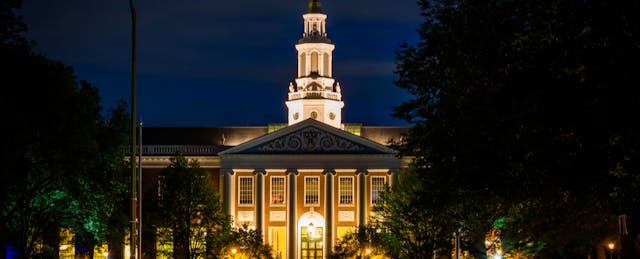Yes, this is a program that’s all about the numbers.
A triad of Harvard institutions—its business School, the Harvard John A. Paulson School of Engineering and Applied Sciences (SEAS), and the department of statistics—are teaming up with Maryland-based digital education company, 2U, to offer an online executive education certificate in business analytics.
It’s a sweet win for 2U, which is steadily building a portfolio of online programs, most of which deliver masters’ degrees. This is only the second “certificate” program for 2U (the other is with the University of North Carolina) but chief executive Chip Paucek expects to see more. The program will open its doors—both real and virtual—to students beginning in March 2018.
Orchestrating a cross-disciplinary program is no small feat, particularly at Harvard. “This was really hard [for Harvard] to pull off,” Paucek says. “It's an intense, cross-disciplinary new offering from a school founded in 1636. The field is new, the offering of a complex blended certificate is new, and it’s being done with HBS, SEAS and the faculty, all blessed by the central administration. And it’s powered by an outside company that’s only 10 years old.”
Several factors nudged the creation of the program, notes Karim Lakhani, a HBS professor and a cofounder of the Harvard Business School Digital Initiative. Professors are intrigued to explore new online pedagogical models that complement Harvard’s existing online efforts, he says. Harvard helped co-found edX, which offers free online classes. Harvard Online Learning groups together the array of online classes, ranging from free programs offered via edX to the (unrelated) HBX platform, that offers executive education programs that companies or individuals pay to take. Even so, “this is the only program that combines seven online courses that have both asynchronous and synchronous learning models with direct interactions with faculty from three Harvard schools and onsite immersions at the HBS campus,” Lakhani wrote in an email to EdSurge.
Data science overall is getting big attention at Harvard. In late March, Harvard unveiled its Data Science Initiative, a cross-university program aimed at connecting the work on data sets by a sweeping number of Harvard researchers. (Some 55 faculty members served on the committee to create the initiative.) The initial seven post-doctoral students with the initiative are due to arrive this autumn.
The bottom line: HBS, Harvard SEAS and FAS faculty all want to put their imprint on the topic that is mesmerizing nearly every type of organization.
And then there’s the opportunity to scale that impact. Harvard’s classic, two-year MBA program, which got started in 1908 with 33 students, today admits just under 1,000 a year. By contrast, HBS’ executive education program, which began in 1945, is ten times larger. More than 10,000 executives make use of Harvard’s programs both on its home turf, as well as in China, India, Europe and Silicon Valley.
2U’s other university partners have seen their work online grow their programs. (For instance, the Rossier School of Education has rapidly increased the number of its master of arts graduates since it began using the 2U platform in 2008.) And they appreciate 2U’s additional support services, including marketing the degree programs and building internship programs. That kind of “bundling, or pairing of technology and support services keeps getting better,” Paucek asserts.
“What Harvard offers on its campus will always thrive,” Paucek notes. “This is more of an ‘and’ than an ‘or.’”


